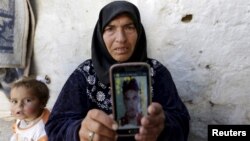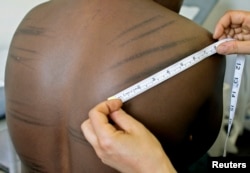International law prohibits torture under all circumstances, yet it remains a widespread practice. Doctors, psychiatrists, lawyers and other experts met Friday at the United Nations in Geneva to exchange views on how to stop torture and how to tackle the long-lasting suffering of victims.
The occasion for the gathering was the 35th anniversary of the U.N. Voluntary Fund for Victims of Torture, which assists about 50,000 victims and their family members every year.
Fund officials say the victims it helps include an increasing number of children and adolescents. Figures show that organizations supported by the fund this year have helped 5,279 child and adolescent victims of torture, up more than 25 percent from the figure for 2015.
The U.N. high commissioner for human rights, Zeid Ra’ad Al Hussein, said Friday that he was shocked by these numbers and by the unspeakable pain and suffering even very young children are forced to endure.
'Unbearable reality'
“The torture of children is an unbearable reality, particularly in countries in conflicts such as Syria. ... Indeed, children are often targeted because they are children, as a way of intimidating entire communities, or to leverage additional pain onto their parents,” he said.
Sana Hamzeh, founder of RESTART, a center for rehabilitation of victims of torture and violence in Lebanon, works with refugee children from Syria and other Middle Eastern countries in conflict and said she had intimate knowledge of the scars of abuse and pain they bear from torture.
“Is it acceptable to allow a child to see his mother be raped or his father be beaten up?" she said through an interpreter. "Is it acceptable to allow a child to hear the screams of pain of his brothers and sisters in a neighboring cell? ... Is it acceptable that the whole world looks on and does not act, although they know perfectly well what is happening to these children?”
'Bruises on my soul'
Hamzeh said these young victims come to therapy sessions gripped by huge physical and mental suffering. She said her role is to help them to speak out. As a therapist, she said, she tries to get these youths to break their silence, but it's hard to do.
“We hear descriptions of untold brutality, psychological violence of unfathomable cruelty," she said. "Let it be known, ladies and gentlemen, that I do not walk away unscathed from my interviews — that the bruises on my soul are increasingly numerous.”
The type of torture seen in the Middle East is repeated throughout the world. The U.S.-based Center for Victims of Torture assists victims in the Middle East but also helps vast numbers in African countries. These include Kenya, the Democratic Republic of the Congo, Rwanda, Burundi, Somalia, Ethiopia, Uganda and South Sudan.
Paul Orieny, a clinical mental health adviser for the center, said torture is complex and multilayered.
Taking on parents' roles
“If you look across these places where we work," Orieny said, "the issues range from, say, Iraqi and Syrian children who are primary and secondary torture survivors in Jordan, to Great Lakes teenagers in Nairobi, who are themselves torture survivors but have to take parental roles from their parents, who are sometimes more adversely affected by the torture and are no longer functional.”
The U.N. victims fund and global networks of physicians, psychologists, social workers and lawyers work tirelessly and with some success in rehabilitating children and adult victims of torture. They help many of the survivors heal and reclaim their lives and rights.
The experts said nations have an obligation to help child victims of torture recover and to be compensated for their suffering. They agreed that rehabilitation is important, but so is justice. They said torturers must be prosecuted and held accountable for their crimes.













